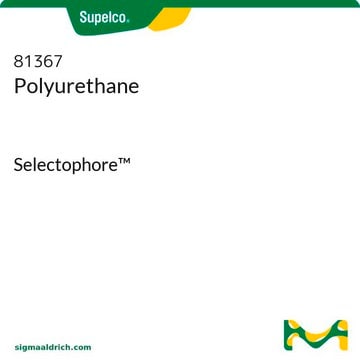U2500
Urethane
≥99%
Synonym(s):
Carbamic acid ethyl ester, Ethyl carbamate, Ethylurethane
About This Item
Recommended Products
vapor density
3.07 (vs air)
Quality Level
vapor pressure
10 mmHg ( 77.8 °C)
Assay
≥99%
bp
182-184 °C (lit.)
mp
48-50 °C (lit.)
SMILES string
CCOC(N)=O
InChI
1S/C3H7NO2/c1-2-6-3(4)5/h2H2,1H3,(H2,4,5)
InChI key
JOYRKODLDBILNP-UHFFFAOYSA-N
Looking for similar products? Visit Product Comparison Guide
Application
- Sex differences in cholinergic signaling affect functional outcomes for theta-gamma coordination in hippocampal subcircuits following experimental febrile status epilepticus.: This study uses urethane anesthesia to investigate the impact of sex differences on cholinergic signaling in the hippocampus, shedding light on neurological responses and potential therapeutic targets (Kloc et al., 2024).
- Postinspiratory and preBötzinger complexes contribute to respiratory-sympathetic coupling in mice before and after chronic intermittent hypoxia.: Urethane is utilized in this study to explore respiratory and sympathetic nervous system interactions, providing insights into adaptive physiological mechanisms (Karlen-Amarante et al., 2024).
- Instant clot forming and antibacterial wound dressings: Achieving hemostasis in trauma injuries with S-nitroso-N-acetylpenicillamine-tranexamic acid-propolis formulation.: This paper presents innovative urethane-based wound dressings that offer rapid clot formation and antibacterial properties, crucial for trauma care (Nguyen et al., 2024).
Signal Word
Danger
Hazard Statements
Precautionary Statements
Hazard Classifications
Acute Tox. 4 Oral - Carc. 1B
Storage Class Code
6.1C - Combustible acute toxic Cat.3 / toxic compounds or compounds which causing chronic effects
WGK
WGK 3
Flash Point(F)
197.6 °F - closed cup
Flash Point(C)
92 °C - closed cup
Personal Protective Equipment
Certificates of Analysis (COA)
Search for Certificates of Analysis (COA) by entering the products Lot/Batch Number. Lot and Batch Numbers can be found on a product’s label following the words ‘Lot’ or ‘Batch’.
Already Own This Product?
Find documentation for the products that you have recently purchased in the Document Library.
Customers Also Viewed
Our team of scientists has experience in all areas of research including Life Science, Material Science, Chemical Synthesis, Chromatography, Analytical and many others.
Contact Technical Service












